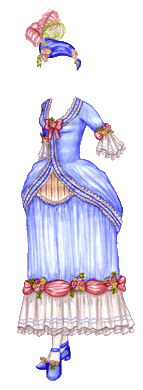 Click for larger version; click for the list of dolls.
Click for larger version; click for the list of dolls.
So I recently finished listening to the Librivox recording of Evelina by Fanny Burney, which is not a book I knew of before browsing the Librivox catalog but I’m quite glad I put in the sixteen hours necessary to listen to it. I don’t recall Evelina being referenced in any of the Jane Austen novels, but I believe a couple of Fanny Burney’s other novels are mentioned in Northanger Abbey. Certainly Austen would have read Evelina, and her characters might have secretly wished for a Lord Orville like everyone seems to wish for a Mr. Darcy these days. It’s about a timid and innocent girl, who is overly both, I think, for modern sensibilities, but still a sympathetic main character. Her situation was so precarious (she has a “mysterious” background and no powerful friends looking out for her interests) and she always seemed to be getting into so many misunderstandings that I had to look the ending up on Wikipedia to make myself less nervous about the possibility of her being deceived by a rake or exposed to ridicule in a way that would destroy her reputation forever. (Having recently come off of The Age of Innocence, and having abandoned Ruth after skimming its Wikipedia page and finding out that things didn’t end well, I couldn’t sink hours into listening to another depressing novel.) I think, though, that it’s a very fun novel even if I fretted over the heroine and her perils. Sir Clement Willoughby is a tremendous bounder and it’s quite satisfying to despise him, and Evelina’s family and acquaintances are all colorful even if they’re mortifying to her. It might remind a modern reader of Austen, but the feeling that something is always about to go wrong makes it more salacious. Elizabeth Bennett was never caught by Mr. Darcy in the company of disreputable women, that’s for sure.
The book was published in 1778, and there aren’t any time references inside the book that meant anything to me, so I’m just going to go with what its readers might have worn although the book perhaps was set a couple years earlier. Corbis has, for some reason, a great number of fashion plates from 1778 (just search “1778 dress”) and I was struck by how different many of them appeared from what I think of from the late 1700s, the robe á la française and the robe à l’anglaise. The style that struck me is apparently the robe à la Polonaise, and even if perhaps Evelina is supposed to be set a couple years earlier than 1778, I will comfort myself with the thought of her wearing many of these dresses after the novel ends. Don’t ask me about the hat. It didn’t quite work out, but the first draft ended up with antennae and a windmill so this is sort of an improvement.
Incidentally, I was a little surprised to find Evelina mentioned in a recent article about the movie Confessions of a Shopaholic, as it boasts “literature’s first shopping spree”. Yeah, I’m probably not going to see that movie, even if it has clothes like this unholy concoction of neon ribbon and dalmatian fur that beg for paperdolling. I was reading an article a while back (couldn’t find it, sadly) talking about how in this economic climate, over-the-top chick flicks like Shopaholic might be edited so that the protagonists learn a couple convenient lessons before the end, which made me think, yeah, I’d probably fork over $8 to watch a movie like “Confessions of a Shopaholic” if the main character ended up like Lily Bart.
By the way, mark your calendars for the 22nd, a week from now: I’m going to be liveblogging (livedrawing?) the Oscars. I don’t know precisely how that will work, but it’s going to be fun.
 Share
Share